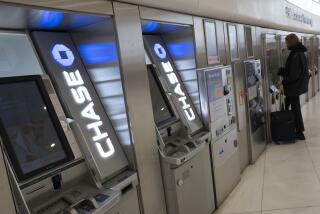S&L; Bailout Plan Would Tax Customers : Treasury Proposal Targets Deposits at Federally Insured Institutions
- Share via
WASHINGTON — White House is considering forcing customers of banks and savings and loans to pay a large part of the multibillion-dollar cost of rescuing the S&L; industry, where hundreds of institutions are failing because of widespread fraud and mismanagement.
Even as President Bush was promising last week not to raise taxes, Treasury Department officials were trying to win support from Congress for a proposal to tax depositors who put money in federally insured institutions, congressional sources said yesterday.
Treasury officials met secretly with leaders of the House Banking Committee last week and Treasury Secretary Nicholas F. Brady met with Senate Republican leaders again Tuesday and discussed the proposal, which would impose a tax of as much as 30 cents for every $100 deposited at a federally insured institution, the sources said.
“It’s the reverse toaster theory,” said Federal Deposit Insurance Corp. Chairman L. William Seidman, when asked what he thought of such a proposal. “Instead of the bank giving you a toaster when you make a deposit, you give them one.”
The proposal--one of several options the White House is considering to raise the $50 billion to $100 billion that it is expected to cost to clean up the S&L; industry--received a very chilly reception in Congress, getting what one White House official called “the Bronx cheer.”
Brady is expected to give Bush a list of options as early as next week to pay for the S&L; cleanup. The options will range from issuing bonds backed by the S&L; industry, to taxes on deposits or other consumer services offered by banks and S&Ls;, to a direct hit on the U.S. Treasury, sources said.
Congressional sources said they did not know if the negative reaction on Capital Hill has caused Brady to remove a tax on customer deposits from the list of options. But they said one option that Brady still is considering is some other sort of “user tax,” possibly a special fee that customers of a bank or S&L; would pay on services other than deposits, such as a home loan.
Under the proposal presented to lawmakers in recent days, Treasury officials envisioned charging what amounts to about one-third of a penny for every dollar of the $3 trillion deposited in checking, savings and other accounts at federally insured banks and S&Ls; nationwide. The tax would raise an estimated $9 billion a year, enough to cover the government’s annual interest payments on the $20 billion to $30 billion it will have to raise annually for several years to close hundreds of insolvent S&Ls; and pay off depositors.
The proposed tax would apply to deposits at S&Ls; and at commercial banks, sources said, so there would be no shift from one federally insured type of institution to another. But congressional leaders said such a tax would make banks and S&Ls; less competitive with money-market funds and other savings accounts that are not federally insured.
And, the leaders said, such a tax would be a nightmare to administer. Treasury officials have not worked out how the fee would be collected, they said.
But no matter what method is used, congressional sources said, customers would end up paying the fee under the Treasury proposal to tax deposits.
Lawmakers in the House promptly objected to the proposal, and senior Administration sources said Brady received a similarly cool response from senators.
Although Bush will be given the Treasury’s list of options soon, the Administration is not expected to unveil the proposals to the public until late February during hearings before the Senate Banking Committee, aides on the committee said.
Officials of the Reagan and Bush administrations have said they want to exhaust every source of private funding to pay for the S&L; bailout before using federal money.
A senior Administration source stressed Tuesday that Administration officials have reached no conclusions and have expressed no preference for one option over another of the many they will present to Bush.
They would not discuss whether any increase in the premium would be charged directly to depositors or added to operating expenses. Bush repeatedly had said he will not raise taxes, using the phrase “Read my lips” as a rallying cry during his campaign and after his election. In interviews last week, he repeated his pledge not to raise taxes, and his newly appointed budget director, Richard Darman, reaffirmed that policy in confirmation hearings before the Senate last week.
Darman made it clear that any charge that looked like a tax would be considered a tax by the new Administration, regardless of whether the charge was called a user fee or any other name.
More to Read
Sign up for Essential California
The most important California stories and recommendations in your inbox every morning.
You may occasionally receive promotional content from the Los Angeles Times.










